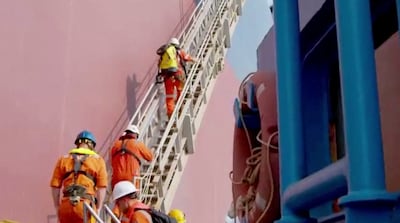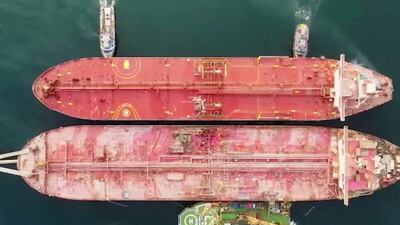With almost all of the 1.14 million barrels of oil aboard the FSO Safer offloaded on to the crude carrier Nautica, experts are wondering what is next for the decaying tanker and its replacement.
So far, 94 per cent of the crude oil has been unloaded, Yemen's state news agency said. That equates to 1,083,285 barrels through 282 hours of work since the process began on July 25. According to the UN plan, the dilapidated Safer, which has remained unmaintained since the Houthi takeover of Sanaa in 2015, will then be cleaned and towed away for scrap.
But experts are not quite certain that the Safer's replacement is going to be an adequate solution in the long run.
“We are nearing the completion of an initial phase to avert the disaster that would've occurred if nothing had been done about the Safer but there is still much to do. In fact, this whole pan is only a temporary measure and right now there's no further step that's finalised by negotiations or planning,” maritime law expert Ian Ralby told The National.
“I think there's a lot of effort that needs to go into determining the best approach to get the oil off the water and replace the floating facility with a land based facility,” he said referring to now-abandoned plans to develop Ras Isa port into an oil terminal, as was originally planned before the war broke out.
Others, like Abdelwahad Al Obaly, a senior employee at the Safer company, raised concerns about Safer's replacement, the Nautica.
“The plan adopted to replace the FSO Safer with a ship that is 15 years old is inefficient from a technical and financial standpoint,” Abdelwahad Al Obaly, a senior employee at the Safer company, told The National.
“There are financial pitfalls in the future regarding the ship's maintenance, insurance and operation which become higher the older the ship is.”
Mr Al Obaly also warned about the harsh environmental conditions of Ras Isa, where the Safer is now moored.
Former head of Yemen's Environment Protection Agency Abdulqader Al Kharraz said that the 47 year-old Safer had been treated specifically to withstand these severe conditions.

“The water of the Red Sea is some of the saltiest in the world. Additionally, the seabed sediment type will eat away at a vessel's hull and the currents of the waters in Ras Isa are particularly fast and strong,” he said.
“The Safer went to Korea for a year for modifications and to convert it from a supertanker to a Floating Storage and Offloading (FSO) vessel. But we don't have enough information about how the Nautica was prepared for the conditions in Ras Isa,” he added, emphasising that the Nautica is not a new ship.
“Additionally, most ports don't accept vessels that are more than 20 years old. So the Nautica only has five more years left in its lifespan.”
Mr Al Kharraz was also not optimistic that the Nautica would depart Ras Isa sooner rather than later, mainly due to the UN handing over the replacement vessel to the Houthis, which they have renamed the Yemen.
Mr Al Kharraz said that the priority is to get the oil cargo away from the sea by ensuring the Nautica departs with the offloaded crude. “Otherwise, we will be in a scenario where two years later, the Houthis are asking the UN for more funds to maintain and operate the vessel.”
Still, Mr Ralby said it is important to “celebrate” that the immediate threat posed by the Safer is coming close to an end.
“The Nautica – now the Yemen – will hold the oil until we can decide what is best to do with it and how to proceed with a more permanent solution.”


